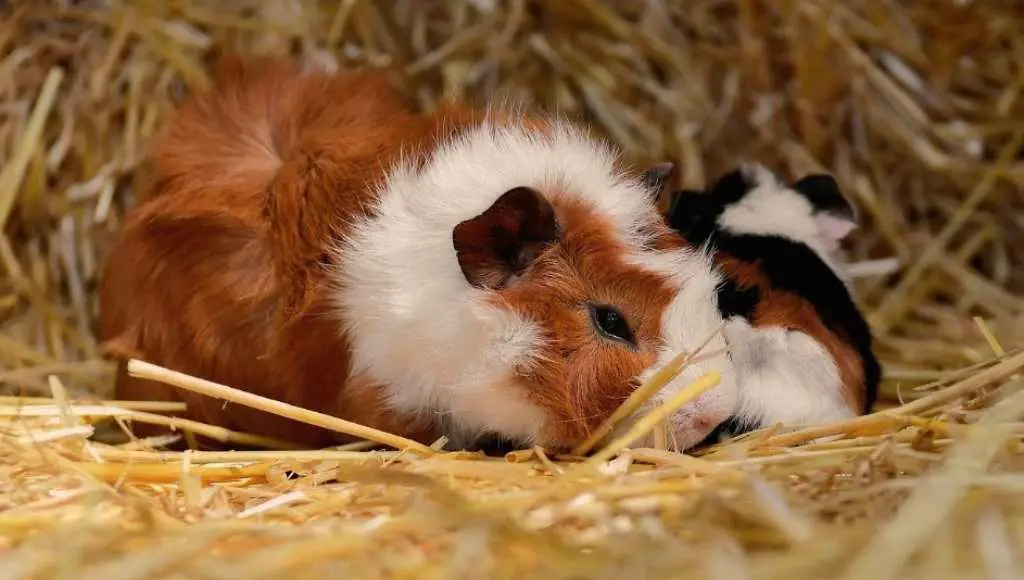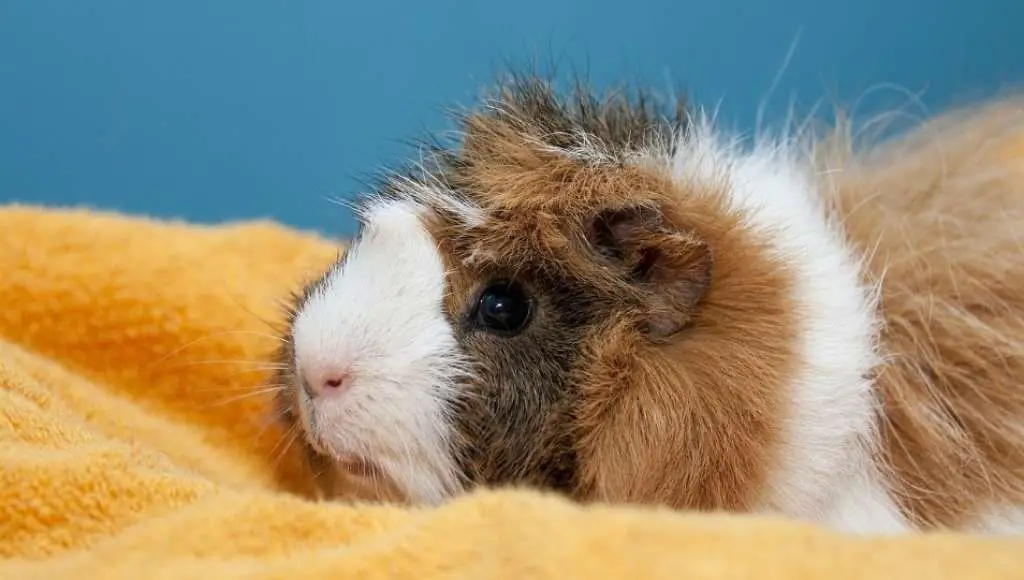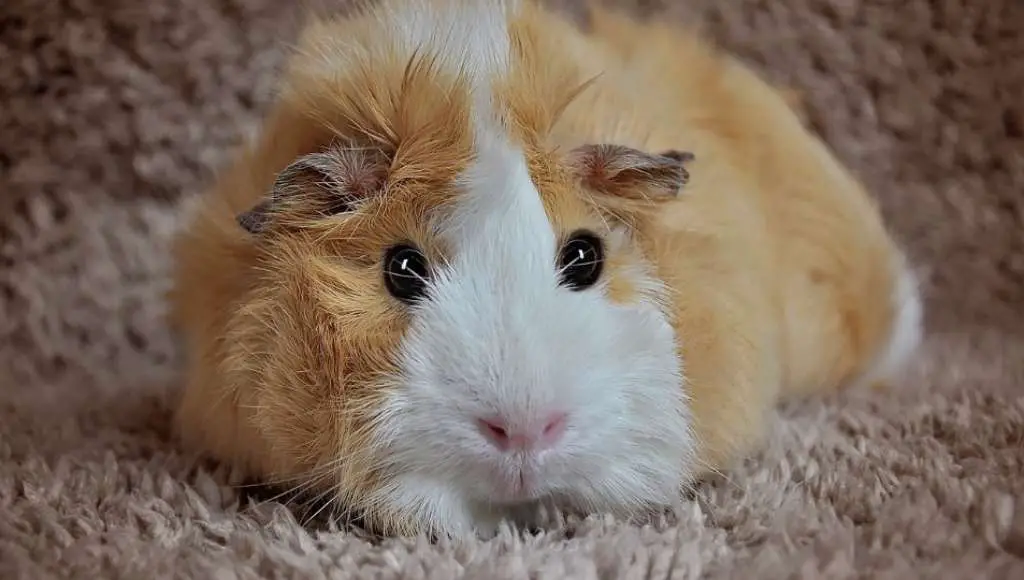13 Most Common Guinea Pig Health Problems Explained

Let’s talk guinea pig health, because our furry friends deserve the best care possible.
In this article, we’ll dive into some common health problems that can affect our adorable guinea pigs.
So, grab your favorite cuppa and let’s ensure our little buddies stay happy and healthy!
Guinea pig health problems
Guinea pigs can experience various health problems, including dental issues due to their inability to produce vitamin C, which can lead to dental, feet, and skin problems, as well as diarrhea and coarse fur.
They are also prone to respiratory infections, ear infections, lumps, bumps, and abscesses, which may require veterinary attention.
Additionally, guinea pigs can suffer from mites, cysts, and cancerous lumps, leading to skin irritation, fur loss, and other discomforts.
It’s important to monitor guinea pigs for symptoms of illness, such as changes in behavior, eating patterns, and signs of pain, and seek veterinary care if any concerns arise.
Let’s break it down further…
Here are some of the most common guinea pig health problems you should know:
1. Respiratory Infections

Respiratory infections are a common health problem in guinea pigs.
Pneumonia is one of the most significant diseases of pet guinea pigs and can be caused by several bacteria, including Bordetella, Staphylococcus, and Streptococcus.
Guinea pigs can naturally harbor these bacteria and may be asymptomatic. The infection can be transmitted through aerosolized particles, contaminated hands, or other objects.
Symptoms include discharge from the eyes or nose, sneezing, trouble breathing, and loss of appetite.
Diagnosis can be made through cultures of the eye and nasal discharge. Treatment may include antibiotics, supportive care, and hospitalization.
Prevention can be achieved by keeping the guinea pig in a clean environment, avoiding contact with other animals, and ensuring they receive enough vitamin C.
2. Dental Problems
Dental problems are a common health issue in guinea pigs. They occur when the teeth of the guinea pig become overgrown or misaligned, leading to pain and discomfort.
Symptoms of dental problems in guinea pigs include difficulty eating, weight loss, drooling, and a decrease in activity level.
A veterinarian can diagnose dental problems in guinea pigs by examining their teeth and mouth.
Treatment for dental problems in guinea pigs may include trimming or filing the teeth, providing pain medication, and adjusting the guinea pig’s diet.
To prevent dental problems in guinea pigs, it is important to provide them with a diet that is high in fiber and low in sugar, as well as regular check-ups with a veterinarian who specializes in exotic animals.
3. Gastrointestinal Stasis
Gastrointestinal stasis is a common and potentially fatal condition in guinea pigs, characterized by a slowdown or complete stoppage of the digestive system, often caused by factors such as an inadequate diet, stress, or underlying diseases.
The condition can lead to painful bloating, anorexia, lethargy, and other serious symptoms.
Diagnosis typically involves a thorough physical examination, palpation of the abdomen, and possibly X-rays and blood work to assess the underlying cause and severity of the condition.
Treatment is usually multi-factorial and aims to address dehydration, pain, and stimulate intestinal motility, which may include subcutaneous fluids and pain management.
Preventing gastrointestinal stasis in guinea pigs involves providing a balanced and nutritious diet, ensuring they have access to high-quality hay, minimizing stress, and allowing for regular exercise.
It’s important to be vigilant for any signs of illness and seek veterinary care promptly if any symptoms of gastrointestinal stasis are observed.
Learn more about the life expectancy of guinea pigs.
4. Diarrhea
Diarrhea is a common health problem in guinea pigs that can be caused by various factors such as bacterial infections, dietary changes, and stress.
Symptoms of diarrhea in guinea pigs include loose or watery stools, decreased appetite, and lethargy.
A veterinarian can diagnose diarrhea in guinea pigs through a physical examination and fecal analysis.
Treatment for diarrhea in guinea pigs may include antibiotics, probiotics, and fluid therapy.
Preventing diarrhea in guinea pigs can be achieved by providing a balanced diet, clean living conditions, and reducing stress.
It is important to seek veterinary care promptly if your guinea pig is experiencing diarrhea to prevent dehydration and other complications.
With proper care and attention, most cases of diarrhea in guinea pigs can be successfully treated.
5. Pneumonia

Pneumonia in guinea pigs is a significant health concern, often caused by bacterial infections such as Streptococcus pneumoniae and Bordetella.
It can lead to symptoms such as respiratory distress, sneezing, loss of appetite, fever, and depression.
Diagnosis is typically based on clinical signs, with X-rays and discharge tests aiding in confirmation.
Treatment involves supportive care, antibiotics (carefully selected to avoid toxicity), oxygen therapy, and vitamin C supplementation.
Preventing pneumonia in guinea pigs includes maintaining a clean and dry environment, avoiding sudden temperature changes, and separating sick guinea pigs from healthy ones.
Additionally, practicing good hygiene, such as wearing gloves when handling sick guinea pigs, is important to prevent the spread of the infection
6. Abscesses
Abscesses can be a concern for guinea pig health, often caused by bacterial infections or injuries.
Symptoms may include swelling, pain, and discharge near the affected area.
A veterinarian can diagnose an abscess through a physical exam and may recommend additional tests, such as a bacterial culture.
Treatment typically involves lancing and draining the abscess, along with antibiotics to combat the infection.
To prevent abscesses, it’s essential to keep your guinea pig’s living environment clean and minimize the risk of injuries.
Regular health check-ups with a vet can also help catch any potential issues early.
By staying attentive to your guinea pig’s well-being and providing a safe, clean environment, you can help reduce the risk of abscesses and keep your pet healthy and happy.
7. Eye Problems
Guinea pigs are prone to various eye problems, including infections, injuries, and genetic conditions.
Symptoms of eye issues in guinea pigs can range from cloudiness and redness to discharge and crustiness.
These problems can be caused by injuries from hay or other guinea pigs, bacterial or fungal infections, and underlying health issues such as respiratory infections or vitamin C deficiency.
If you notice any of these symptoms, it’s important to seek veterinary care promptly, as untreated eye problems can lead to blindness.
A veterinarian can diagnose the specific issue and recommend appropriate treatment, which may include eye ointments, antibiotics, or other medications.
To prevent eye problems, maintain a clean cage, provide a quality diet, and seek veterinary care promptly if you suspect any health issues in your guinea pig
8. Parasites
Parasites can be a concern for guinea pig health, with mites, lice, fleas, and worms being common culprits.
These parasites can cause a range of issues, including skin problems, diarrhea, and weight loss.
They can be transmitted through contaminated water, feed, or contact with wild animals or their feces.
Symptoms of parasitic infestation in guinea pigs may include skin problems, itching, hair loss, diarrhea, and weight loss.
Diagnosis is typically done by a veterinarian through a physical examination and, if necessary, skin scrapings or fecal tests.
Treatment usually involves medication prescribed by a vet, and in the case of mites, special shampoos may be recommended.
To prevent parasitic infestations, maintaining good hygiene in the guinea pig’s living area, providing fresh food and water, and avoiding contact with wild animals or their feces are important measures.
Regular vet check-ups and thorough washing of vegetables can also help prevent parasitic infections.
9. Urinary Tract Infections (UTIs)
Urinary Tract Infections (UTIs) can be a concern for guinea pig health.
They are often caused by bacteria, with female guinea pigs being more susceptible due to their shorter urethras and the proximity of the anus to the urethra, which facilitates bacterial transmission.
Common symptoms of UTIs in guinea pigs include fever, inappetence, squeaking when urinating, lethargy, and blood in the urine.
To diagnose a UTI, a veterinarian may perform an ultrasound or X-ray to visualize the urinary tract and rule out other conditions like urinary stones.
Treatment typically involves antibiotics such as enrofloxacin and supportive care like fluid therapy and pain management.
To prevent UTIs, owners are advised to provide a low-calcium diet, avoid high-oxalate foods, and ensure their guinea pigs receive adequate daily fluid intake.
Additionally, maintaining a clean living environment and promptly addressing any signs of illness are important for preventing UTIs in guinea pigs.
10. Ringworm (skin fungus)

Ringworm is a fungal infection that affects the fur, skin, and nails of guinea pigs.
It is caused by the Trichophyton mentagrophyte organism, which is present in the soil and can be carried by animals or humans.
Guinea pigs can get ringworm from other infected guinea pigs, or it can develop in a guinea pig that has been carrying the spores.
Symptoms of ringworm in guinea pigs include irregular patches of fur loss, crusts at the edges of lesions, redness or inflammation on the face, feet, and trunk/dorsum, and a roughened hair coat.
Ringworm can be diagnosed through fungal cultures, and treatment involves antifungal creams, shampoos, and oral medications.
It is important to improve sanitary conditions in the environment and disinfect the cage once a week during treatment to prevent reinfection.
To prevent ringworm in guinea pigs, it is essential to keep their environment clean, provide adequate space and ventilation, and schedule regular check-ups with a veterinarian.
11. Scurvy (vitamin C deficiency)
Scurvy is a common health problem in guinea pigs caused by a deficiency of vitamin C in their diet, which can lead to symptoms such as poor hair coat, poor appetite, weight loss, lethargy, joint pain, swollen and bleeding gums, and hair loss.
To diagnose scurvy, a veterinarian will perform a physical examination and may recommend blood tests to check for vitamin C levels.
Treatment for scurvy involves increasing the vitamin C levels in the guinea pig’s diet through specific foods, water-soluble vitamin concentrate, or a solid supplement, as recommended by the veterinarian.
Pain relief medication may also be given to manage the guinea pig’s discomfort.
To prevent scurvy, it is important to feed guinea pigs a balanced diet high in vitamin C, which can be obtained from fresh fruits and vegetables such as bell peppers, broccoli, spinach, and kale.
Vitamin C supplements are also available in most pet shops, but it is important to consult a veterinarian before using them.
12. Pododermatitis (Bumblefoot)
Pododermatitis, also known as bumblefoot, is a common and painful foot issue in guinea pigs that can range from mild irritation to severe infection.
It is caused by poor husbandry, such as housing on abrasive surfaces, soiled and wet bedding, and abrasive carpets, as well as other factors like obesity, lack of exercise, and overgrown nails.
Symptoms include calluses, hair loss, scabbing, bleeding, and foul-smelling discharge.
To diagnose pododermatitis, a veterinarian will examine the guinea pig visually and take a thorough history of its health, diet, and living conditions.
Treatment involves addressing underlying causes, supplementing with vitamin C, clipping overgrown nails, and providing pain management.
Antibiotics may also be necessary to target the bacteria causing the infection.
Prevention involves keeping the environment clean and dry, housing guinea pigs on soft, nonabrasive bedding, and avoiding obesity.
Regular grooming and exercise can also help prevent pododermatitis.
13. Obesity
Obesity can be a significant health problem for guinea pigs, leading to negative impacts on their health, welfare, and quality of life.
It is usually caused by an imbalance between energy intake and expenditure, often due to overfeeding and lack of exercise.
Symptoms of obesity in guinea pigs include difficulty moving, shortness of breath, and an inability to groom themselves properly.
A veterinarian can diagnose obesity in guinea pigs through a physical examination and by assessing their body condition and weight.
Treatment involves implementing a weight loss program, which may include adjusting the diet, increasing exercise, and providing a stimulating environment.
To prevent obesity, it’s essential to provide a suitable living environment, offer a balanced diet high in fiber and low in fat and sugar, and ensure regular exercise and mental stimulation.
By being mindful of their diet and activity levels, and seeking veterinary care when needed, guinea pig owners can help prevent and address obesity in their pets.
Learn more about identifying a sick guinea pig.
FAQs
Can guinea pigs get sick easily?
Guinea pigs have delicate immune systems and can be prone to various health issues. While they may not get sick easily, it’s important to provide them with a balanced diet, a clean living environment, and regular veterinary check-ups to help prevent potential health problems.
What are the common health issues that guinea pigs face?
Some common health problems in guinea pigs include respiratory infections, dental issues, skin infections, diarrhea, parasites, and vitamin C deficiency. It’s essential to monitor your guinea pig’s behavior and appearance to catch any signs of illness early on.
How can I prevent respiratory infections in my guinea pig?
Respiratory infections are a common problem in guinea pigs, especially if they are housed in damp or poorly ventilated environments. To prevent respiratory issues, ensure their living area is clean, dry, and well-ventilated. Avoid exposing them to drafts or sudden temperature changes.
What should I do if my guinea pig has dental problems?
Dental issues, such as overgrown teeth or tooth malocclusion, can cause pain and difficulty eating for guinea pigs. If you notice any signs of dental problems, such as drooling, weight loss, or difficulty chewing, it’s important to consult a veterinarian who specializes in exotic pets.
Are there any specific signs of illness in guinea pigs that I should watch out for?
Yes, there are several signs that may indicate your guinea pig is unwell. These include a decrease in appetite, weight loss, lethargy, changes in behavior or activity levels, discharge from the eyes or nose, diarrhea, excessive scratching, or hair loss. If you notice any of these signs, it’s best to seek veterinary advice.
How can I provide a healthy diet for my guinea pig to prevent health problems?
Guinea pigs have specific dietary requirements, and a lack of certain nutrients can lead to health issues. Ensure they have access to fresh, clean hay for proper digestion, a variety of fresh vegetables high in vitamin C, and a limited amount of pellets formulated specifically for guinea pigs. Avoid feeding them foods that are toxic to them, such as chocolate or onions.
Learn more about the signs of a dying guinea pig.
Conclusion
In conclusion, taking care of your guinea pig’s health is essential for their well-being. By being aware of common health problems like respiratory issues, dental problems, and vitamin C deficiency, you can provide the necessary care and prevent these issues from arising. Remember, a happy and healthy guinea pig is a delightful companion that will bring joy to your life for years to come!
